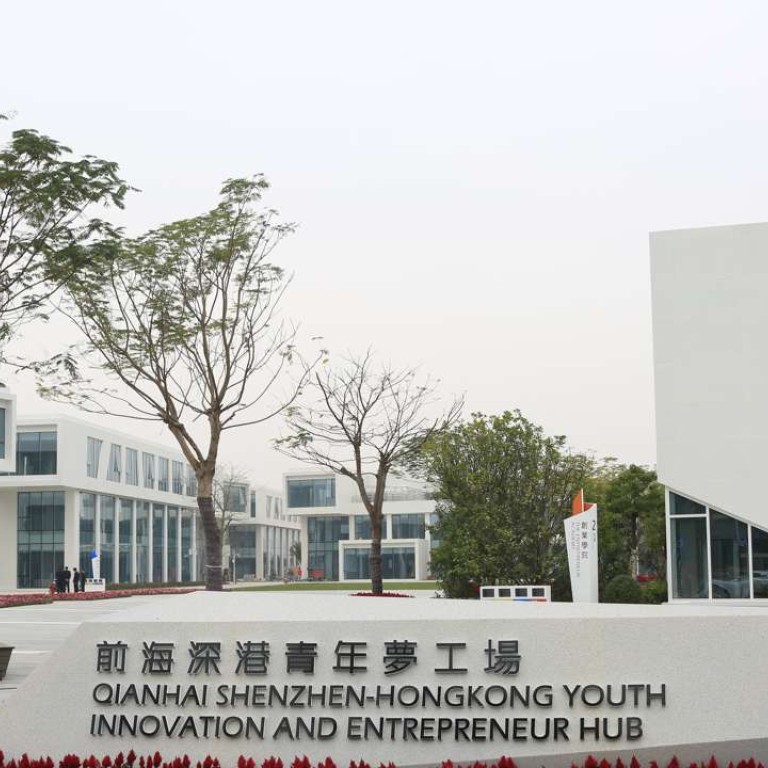
New | Qianhai signs on 23 financial firms in its SZ-HK Fund Town
The concept is modelled on Greenwich in Connecticut, which has successfully recast itself as America’s hub for hedge funds and financial services firms
Bank of East Asia and Credit Suisse Group are among 23 financial services companies that will set up offices in a new special economic zone established in Qianhai, Shenzhen.
Known as the Qianhai SZ-HK Fund Town (前海深港基金小鎮), the new area is scheduled to finish construction in October, with 29 buildings that can accommodate 100 fund management companies. Shenzhen Metro, the city’s subway operator, is the developer of the zone, while Qianhai Financial Holdings manages the leasing.
China is trying to recast Shenzhen as a hub for technology and financial services, nearly four decades after the city spearheaded the country’s hurtle towards a free-market economy.
The city is home to one of the country’s three stock exchanges and the head offices of several of the world’s biggest technology companies, including Huawei Technologies, ZTE Corp and Tencent Holdings.
Qianhai, developed from about 15 sq km of reclaimed land, is earmarked to be the hub for innovation, services, as well as the country’s economic integration and collaboration with Hong Kong. A youth innovation and entrepreneur hub has already been in operation for a year.
The concept follows the American model of Greenwich in Connecticut, which was established as a hub for hedge funds and financial services firms.
Companies based there include Interactive Brokers and AQR Capital Management.
Qianhai also has its sights on private banking and wealth management firms, whose target clientele – individuals whose investible assets exceed US$1 million – have surpassed North America in 2015. Guangdong province, which covers Shenzhen and Qianhai, also claims to have the largest population of wealthy individuals, with 240,000 having investible assets exceeding 10 million yuan (US$1.45 million).
There was room for fund management and private equity firms in Qianhai, Li Qiang, the chairman of Qianhai Financial, said at a forum to promote the zone.
Already, 124,560 companies have registered in Qianhai, of which 51,188 are financial firms, with 90 per cent of them classified as wealth managers, Li said.
Shenzhen is a base for private equity investors, with 3,383 such firms registered at the end of last year, or nearly 20 per cent of the country’s 17,433 private equity firms. Seven of every 10 Shenzhen private equity firms were in Qianhai, Li said.
Qianhai will lower the financial threshold to attract Hong Kong’s wealth managers to relocate, or at least move part of their operations, to Qianhai. The size of assets managed in Hong Kong reached HK$17.4 trillion (US$2.24 trillion) in 2015.
China Construction Bank, Hang Seng Bank, China Travel Financial Investment and a number of other Shenzhen-based financial firms are among the other occupants of the area.
The project was “important to promote wealth management services in Qianhai”, said Xiao Zhijia, a deputy director general of financial affairs for the Shenzhen municipal government. “We would like Hong Kong’s wealth management companies to export their experience and standards to Qianhai.”
Richard Li, an executive vice-president and head of retail banking and wealth management at HSBC China, said Qianhai had many technology companies which could help financial firms promote the use of technology to enhance wealth management services.
Hong Kong fund managers welcomed the Qianhai project, Hong Kong Investment Funds Association chief executive Sally Wong Chi-ming said.
“We believe Hong Kong can develop joint initiatives with Qianhai to further leverage on the two-way flows to enable international investors to gain exposure to the mainland capital markets, and to enable mainland investors to build globally diversified portfolios,” she said at the forum.
“There are a number of areas we can work together, from capacity building to mutual recognition of qualifications and from standard setting to talent management. HKIFA would be following up with the relevant authorities in Qianhai to continue the dialogues.”


